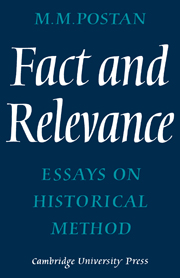Book contents
- Frontmatter
- Contents
- Acknowledgments
- Preface
- 1 Reason in social study
- 2 History and the social sciences
- 3 The historical method in social science
- 4 Function and dialectic in economic history
- 5 Fact and relevance in historical study
- 6 Economic and social history
- 7 Economic growth
- 8 A plague of economists?
- 9 The uses and abuses of economics
- 10 Agriculture and economic development: a lesson of history
- 11 Technological progress in post-war Europe
- 12 A study of history
- 13 Karl Marx: a democrat?
- 14 Hugh Gaitskell: political and intellectual progress
- Index
9 - The uses and abuses of economics
Published online by Cambridge University Press: 07 October 2011
- Frontmatter
- Contents
- Acknowledgments
- Preface
- 1 Reason in social study
- 2 History and the social sciences
- 3 The historical method in social science
- 4 Function and dialectic in economic history
- 5 Fact and relevance in historical study
- 6 Economic and social history
- 7 Economic growth
- 8 A plague of economists?
- 9 The uses and abuses of economics
- 10 Agriculture and economic development: a lesson of history
- 11 Technological progress in post-war Europe
- 12 A study of history
- 13 Karl Marx: a democrat?
- 14 Hugh Gaitskell: political and intellectual progress
- Index
Summary
My article in the January issue of Encounter obviously invited a lively and even an angry come-back. To have given voice to well-concealed doubts about a group of academic neighbours is provocative enough; but what must have aggravated the provocation is that the group's own view of itself happens to be highly neurotic. It is well known for its high opinion of its intellectual status, but is at the same time suspected of a conspiratorial, augur-like, awareness of its inadequacies. I was therefore prepared for the response to be suitably aggressive. In the event it has turned out to be pleasantly disappointing. With the exception of a characteristically brash article in the New Statesman, most published comments and private reactions, both by letter and by word of mouth, have been more moderate and understanding than I had the right to expect.
Indeed some of the responses to my articles have carried their apparent support to a length which I, for one, find embarrassing. Mr Peter Wiles's disenchantment with current policies extends to the Western economy as a whole. His cure for Britain's ills is to subject foreign trade and payments to a regimen of quotas and allocations à la Russe. I trust that remedies as desperate as this will never be part of the British pharmacopoeia. An occasional imposition of what is euphemistically called ‘physical controls’ may at times be inescapable, but directed trade as a permanent feature of British economy is a condition more morbid than the one Mr Peter Wiles is trying to cure.
- Type
- Chapter
- Information
- Fact and RelevanceEssays on Historical Method, pp. 92 - 102Publisher: Cambridge University PressPrint publication year: 1971



